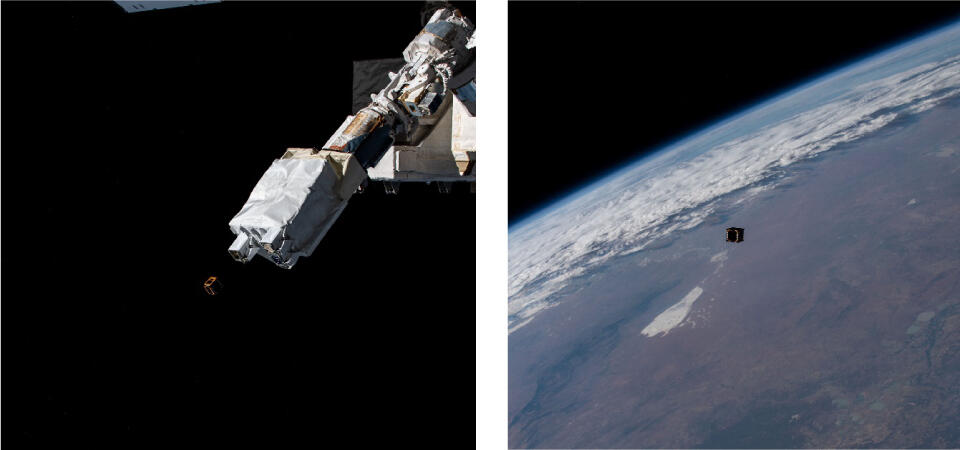Successful Deployment of Surya Satellite-1 of Indonesia,
Selected in the Third Round of KiboCUBE Programme
January 11, 2023 (JST)
Japan Aerospace Exploration Agency
On January 6, 2023, Surya Satellite-1(SS-1), was successfully deployed from the Japanese Experiment Module “Kibo” of the International Space Station (ISS).
The CubeSat was developed by the team of Surya University from the Republic of Indonesia, selected as the winner in the third round of KiboCUBE programme run by the Japan Aerospace Exploration Agency (JAXA) and the United Nations Office for Outer Space Affairs (UNOOSA).
H.E. HERI Akhmadi, Ambassador of the Republic of Indonesia to Japan was present at Tsukuba Space Center to witness the deployment. It was also broadcasted online, through which H.E. KANASUGI Kenji, Ambassador of Japan to the Republic of Indonesia and the team of Surya University among other people in Indonesia witnessed the deployment.
SS-1 has been operated by the team of Surya University after its deployment, and the experience gained through development and operation of the satellite is expected to benefit the future space activities in Indonesia.
Timeline through the deployment of Surya Satellite-1
| September 2018: | Selected as the winner in the third round of KiboCUBE Programme |
|---|---|
| July 2022: | Handed over to JAXA at JAXA Tsukuba Space Center |
| November 2022: | Launched to the ISS from NASA Kennedy Space Center |
| January 2023: | Deployed from Kibo module of the ISS with JEM robotic arm |

Surya Satellite-1 deployed from the ISSphoto by JAXA/NASA

H.E. HERI Akhmadi, Ambassador of the Republic of Indonesia and his delegation at Tsukuba Space Center

SS-1 deployment event held in Indonesia (left) ©SS-1 Project team
H.E. KANASUGI Kenji, Ambassador of Japan to the Republic of Indonesia making remarks in the event (right) ©SS-1 Project team
Quotes:
JAXA Director General of Human Spaceflight Technology Directorate, SASAKI Hiroshi, said:
“It is our pleasure that JAXA successfully deployed Surya Satellite-1 from Kibo module of the ISS. We would like to extend our respect to UNOOSA and the Surya University for their efforts. Surya Satellite-1 has significant missions ahead including communication technology demonstration, to which I wish a great success. We also wish the experience gained through the development and operation of Surya Satellite-1 will lead to the next steps of space activity in Indonesia, and we truly hope that we could collaborate with Indonesia again in the near future. Congratulations!”
UNOOSA Acting Director Niklas Hedman said:
"Congratulations to Surya University and the supporting team for this tremendous accomplishment. It is impressive how the team prevailed despite the challenges posed by COVID-19! We look forward to SS-1 realizing its mission and pushing forward the momentum of space-related activities in Indonesia. We are proud to work with JAXA on KiboCUBE as it continues bridging the space divide and shedding light on many countries that are working so hard to develop space capacities. We look forward to deepening our cooperation and providing more opportunities in the coming years.”
Rector of Surya University Lindawati, Ph.D said:
“We are pleased with the successful deployment of Surya Satellite 1 (SS-1) from the International Space Station. We hope for a smooth operation of SS-1 during its mission, so that it can be beneficial for many people, especially in Indonesia.
Surya University also expresses our sincere gratitude to UNOOSA, JAXA, and other stakeholders and sponsors for this collaboration since we got awarded the KiboCUBE deployment opportunity in 2018. This is an important milestone for Surya University, as well as for Indonesia, since this is the first nanosatellite program, which is technically designed and manufactured by undergraduate students from Surya University- Indonesia.
We hope that this achievement can further trigger the development of a similar program by students, to benefit our communication and informatics field.”
JAXA’s Activity for SDGs
Supporting emerging and developing countries with building small satellite development technologies

KiboCUBE (joint project between JAXA and the UN Office for Outer Space Affairs (UNOOSA) to provide deployment opportunities for small satellites)
JAXA supports emerging and developing countries which are yet to establish satellite development technologies with efforts to build small satellite development technologies, and provides opportunities to deploy small satellites built by those countries from the Japanese Experiment Module “Kibo” on the International Space Station (ISS). By promoting this project, JAXA provides emerging and developing countries with opportunities to access outer space for demonstration and other purposes, thereby helping them build and improve space development technologies and usage capabilities.